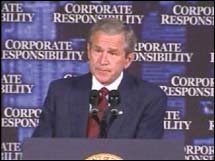
Increasingly, as President Bush's approval ratings have continued their southward slide, there has been a call from his most ardent supporters - often I believe, the mythical "values voters" who admire Mr. Bush's "steadfastness" and "resolution" - to admire him for governing by his convictions rather than by poll numbers. This is a false set of alternatives however, implying that there is no middle ground, and worse, that there are no additional options.
The president is elected to represent the people of the United States, which entails both guiding the country as it’s commander in chief and reflecting the will and interests of the citizenry through policy. The problem with President Bush is that he has been wholly focused on the first, and has actively avoided any semblance of addressing the second. Worse, in regard to his position as commander in chief, he has disregarded changing realities on the ground both domestically and internationally, and has ignored inputs that would make his overall goals more viable.
A president should certainly have convictions, but he (or she) must also realize that the world is not some cartoon realm of good and evil; it is instead merely full of people, many of whom have widely divergent viewpoints and vested interests. The president must understand that, while convictions are an excellent method for framing goals and policies, adaptation and the ability to absorb new data are also crucial.
President Bush’s approach has been to act as if the world is as he wants it, rather than as it is. His view of reality on Wednesday is the same as it was on Monday, no matter what happens on Tuesday. (To borrow a phrase from Steven Colbert.) And while that may be fine in certain other aspects of life, it is a recipe for disaster for any kind of leader.
The well-deserved criticism of President Bush is that he has displayed terrible incompetence rooted in an arrogance that he knows what's best, despite anything those who know more than he does may have to say, and despite what goes on around him. Just because someone – whether it be the president or the man in the street – believes something to be true (in other words, has a conviction) doesn’t mean he’s right or even effective. It is not a question of “convictions” versus “governing by polls”; it is rather one of objective, clear-headed deliberation versus emotional, wishing thinking based on ignorance.
And that brings us to the real question: Should this president - or any president for that matter - not develop his strategy from the widest possible array of data and expertise, adjusting his tactics to fit a changing world, rather than form and pursue both based on preconceived notions that have failed when tested in reality?
The president is elected to represent the people of the United States, which entails both guiding the country as it’s commander in chief and reflecting the will and interests of the citizenry through policy. The problem with President Bush is that he has been wholly focused on the first, and has actively avoided any semblance of addressing the second. Worse, in regard to his position as commander in chief, he has disregarded changing realities on the ground both domestically and internationally, and has ignored inputs that would make his overall goals more viable.
A president should certainly have convictions, but he (or she) must also realize that the world is not some cartoon realm of good and evil; it is instead merely full of people, many of whom have widely divergent viewpoints and vested interests. The president must understand that, while convictions are an excellent method for framing goals and policies, adaptation and the ability to absorb new data are also crucial.
President Bush’s approach has been to act as if the world is as he wants it, rather than as it is. His view of reality on Wednesday is the same as it was on Monday, no matter what happens on Tuesday. (To borrow a phrase from Steven Colbert.) And while that may be fine in certain other aspects of life, it is a recipe for disaster for any kind of leader.
The well-deserved criticism of President Bush is that he has displayed terrible incompetence rooted in an arrogance that he knows what's best, despite anything those who know more than he does may have to say, and despite what goes on around him. Just because someone – whether it be the president or the man in the street – believes something to be true (in other words, has a conviction) doesn’t mean he’s right or even effective. It is not a question of “convictions” versus “governing by polls”; it is rather one of objective, clear-headed deliberation versus emotional, wishing thinking based on ignorance.
And that brings us to the real question: Should this president - or any president for that matter - not develop his strategy from the widest possible array of data and expertise, adjusting his tactics to fit a changing world, rather than form and pursue both based on preconceived notions that have failed when tested in reality?
No comments:
Post a Comment